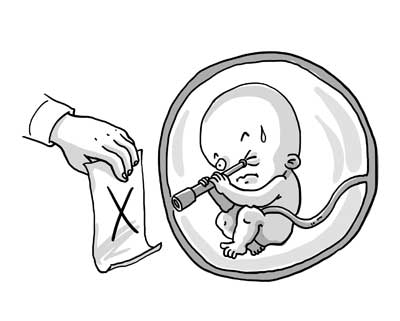Population checks still needed to keep delicate social balance
|
|
|
By Liu Rui |
Being an only child can be hard. That's why my wife and I decided we'd have at least two kids. This idea seems to have become mainstream, as public sympathies are definitely against the strict enforcement of the one-child policy. Some even hold that the policy itself is a bad idea, and list the damage, both personal and demographic, it has caused.
I grew up in the countryside and witness all kinds of chaos that families caught with excess children suffered, like houses being torn down, livestock confiscated and their home besieged by the local police. And there were also people who suffered from disabilities, loss of working capacity and failed marriages after enforced sterilization. Some even committed suicide.
These experiences strongly contribute to the Chinese collective memory of the policy, and have led to calls for its adjustment.
But my own memories of the harsh enforcement of the policy in the rural areas does not automatically make me sympathetic to those who would abolish the policy. We have to remain rational, rather than being influenced just by personal sob-stories. There are some commonly misjudged issues around the policy.
First of all, there were decades of policy exploration before China enforced the family planning measure, so it was a prudent decision that met the needs of the time.
In the 1980s, it was clear that the birth rate was rising to such heights that China's resources and environment would become even more stretched, ultimately leading to ecological and social disaster.
It was because of the extreme and violent behavior in the implementation of the policy, and the lack of proper follow-up medical services that the negative effects were magnified and left many with permanent scars.
Actually, ever since 1990s, the family planning policy in China has been adjusted dynamically, with an improved and friendly enforcement approach that is not as rigid as some people have believed.
However, scientific planning is needed if the authorities decide to allow more than one child per family. If we fail to find the right balance, distorted demographics and overpopulation could both be serious consequences.
We have to consider the historical role of the policy. It has been suggested that China's achievements solely resulted from reform and opening-up which had nothing to do with population control, and some even say the policy has harmed the country's economic growth.
Such comments are unfair. In fact, the strictly implemented policy made an undeniable contribution to reducing dependency, increased capital accumulation and created a decade-long opportunity for the demographic dividend.
Certainly we paid a huge price at the same time, but for the future, there is no reason to be pessimistic, because the economic developments facilitated by the demographic dividend have laid a solid foundation. Given proper measures, we're likely to achieve the balanced, coordinated and sustainable developments.
Many countries and regions have a more specific long-term plan for population management. The difference in China lies in the enforcement of the family planning, not in the idea of population management.
What people are opposed to is the enforcement of the law without any sense of humanity. They stand against the brutal implementation, not the family planning per se.
We should understand this, and look to family planning methods that are more humane, as well as conducting a real public discussion on the issue.
Any social policy has its limitations. China's family planning is no exception. We cannot be indecisive and secretive about the remaining defects of the policy. Yet at the same time we cannot push for hasty change, or the results could be a disastrous social imbalance.
The author is director of the social research center at Zhejiang University.
 0
0 








Go to Forum >>0 Comments